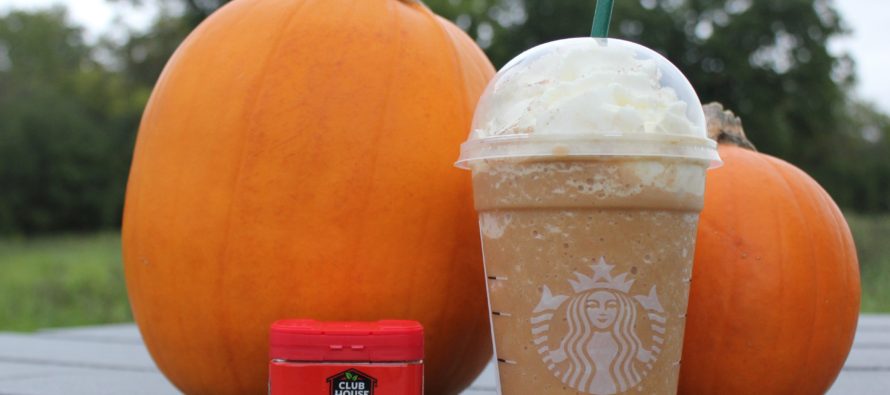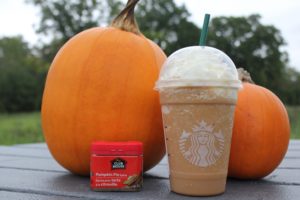Pumpkin Spice Frenzy

Worshipped by many, mocked by some and enjoyed as an occasional treat by others, pumpkin spice, well, everything, seems to dominate our minds this time of year.
Every September, without fail, the social fascination with pumpkin spice emerges. The pumpkin spice latte, or ‘PSL’ as it’s called, marks the unofficial arrival of fall – with Instagram-worthy pics of Starbucks cups, tall boots, pumpkins and falling leaves not far behind.
But how did this quintessential fall craving become the thing that it is today?
Humble beginnings
For Chole Nichol, 19-year-old pumpkin spice enthusiast, her love for the flavour started when she was just eight years old.
“Does pumpkin pie count as pumpkin spice?” Nichol said. “From there I tried pumpkin spice Frappuccinos and pumpkin spice lattes.”
What attracts Nichol to pumpkin spice is a variety of things, but mostly – the spice(s).
“I’m really big on cinnamon,” said Nichol. “The use of cinnamon in the pumpkin spice I think was probably what made me fall in love with it. And I like fall – I like fall things. I like my seasons. So I’m very big on pumpkin spice.”
The PSL would not be possible without its namesake – pumpkin pie spice, a pre-mixed batch of spices used for pumpkin pie and other desserts. Most recipes of pumpkin pie spice include cinnamon, nutmeg, ginger, cloves and allspice – but not pumpkin, as many incorrectly assume. Versions of spice mixes for the fall season have been around for centuries, but marketing for pre-mixed pumpkin pie spice did not begin until the early twentieth century, according to the Farmer’s Almanac.
Starbucks developed its famous drink in 2003 (originally featuring only the spices and no pumpkin flavour) after the success of its Eggnog and Peppermint Mocha seasonal drinks. It was a hit, eventually becoming the restaurant’s most popular seasonal drink and an official Starbucks trademark.
Today, you can purchase several variations of pumpkin spice flavoured drinks. Not just a Starbucks treat anymore, its major competitors have jumped on the pumpkin wagon as well. Pumpkin spice flavoured baked goods have also become increasingly popular. Pumpkin spice muffins, loaves, cookies and even ice cream grace the drive-thru menu. Even such things as pumpkin spice dog food and pumpkin spice Spam now exist.
What began as a simple Starbucks seasonal flavour in 2003 has come to dominate the fast food market, being released earlier and earlier in the season and accompanied by a countdown.

A pumpkin spice frappucinno surrounds pumpkins and pumpkin pie spice. Photo by Rylee Shae.
What’s the appeal?
Dave Bussière, associate professor of marketing at the Odette School of Business, has interesting insights into the marketing of pumpkin spice products. He says there are two sides: the consumer side and the business side.
“If you start with the consumer side, individuals like new things and new product availability,” said Bussière.“ It also speaks to sort of a change in season – we move from summer to fall. So the onset, the reintroduction of pumpkin spice products is a sign, ‘OK. We’re in fall now.’”
On the business side, Bussière says typical restaurants like Tim Hortons have a regular, steady flow of product that they purchase to sell to consumers.
“By introducing the special flavors periodically, what they do is they get a bump of interest from people who may not have bought coffee today,” said Bussière. “That means a spike in interest, a spike in sales and possibly bringing in people who normally would not come to my store”
But why is it such a big deal every year?
“The lack of availability all year round heightens the interest when it actually comes back,” said Bussière. “If I take it away from pumpkin spice for a bit, McDonald’s every few years brings back the McRib. There’s not enough interest for it to always be on the menu.”
But when that “limited time only” thing does come back, people think that they may as well get it, said Bussière.
“That rarity, that scarcity also plays into the interest,” said Bussière. “Limited time. It’s available now. Special. You’ve been waiting for it and so on and so forth.”
As its popularity has increased, other brands have tried to cash in on the fad of the PSL. While Nichol believes Starbucks is the best, she ranks McDonalds second in her list.
But why do brands so often play copycat when it comes to these trends?
“In business school and in marketing, we try and say, it’s nice to have an advantage or an offering that your competitors can’t duplicate,” said Bussière. “Anybody can add pumpkin spice, right? It’s not like Starbucks has the exclusive rights to pumpkin spice. So therefore, If it works, competitor may as well try to neutralize the advantage that Starbucks was trying to get through that offering.”
The bottom line
Nichol believes lovers of the traditional pie should try anything pumpkin spice flavoured.
“I think anybody who likes pumpkin pie will probably like pumpkin spice because it does taste a lot like pumpkin pie,” Nichol said. “I love pumpkin pie. It’s my favorite pie ever.”
Regardless of the trendy-ness of it, the flavour isn’t for everyone. Nichol says her friends just don’t get it.
“They just shake their head,” said Nichol. “Not many of my friends like it. They feel it’s a little bit too strong.”
The hate felt by some certainly does not affect Starbuck’s sales – with an estimated 424 million pumpkin spice lattes sold worldwide each season, according to CNBC. In fact, pumpkin spice products accounted for $500 million in sales in 2015, according to Forbes reporter Clare O’Connor.
But whether you love or hate it, Bussière says that doesn’t matter to major retailers.
“I am not their customer. I get a black coffee, that’s it,” said Bussiere. “Adding anything to it does not attract me. But that’s not a problem for them. Anytime you come up with something, it will be attractive to some segment of the population, it will not be attractive to another segment of the population.”
Want to try it for yourself to see what the hype is all about? You can make your very own PSL with Starbuck’s official recipe (which I have copied here), including a recipe for your own homemade pumpkin spice syrup!
HOMEMADE PUMPKIN SPICE SYRUP
INGREDIENTS
- 1 1/2 cup granulated sugar
- 1 1/2 cup water
- 6 cinnamon sticks
- 1 tsp ground cloves
- 1 tsp ground ginger
- 2 tsp ground nutmeg
- 4 Tbsp pumpkin purée
TOOLS
- Cheesecloth
- Saucepan
- Combine sugar and water in saucepan and bring to a simmer.
- Once sugar is dissolved, add cinnamon sticks, ground cloves, ginger, nutmeg and pumpkin purée, then let simmer for 20 minutes.
- Remove from heat and immediately strain through cheesecloth.
HOMEMADE PUMPKIN SPICE LATTE
INGREDIENTS
- Brewed Coffee
- 1 capsule Starbucks® Espresso Roast
- OR
- 1 capsule Starbucks® by Nespresso® Espresso Roast
- 1 cup whole milk
- 3 Tbsp Homemade Pumpkin Spice Syrup
- 1/2 cup whipped cream
- 1 pinch pumpkin pie spice (garnish)
TOOLS (Optional)
- Milk Frother
- (OPTIONAL) Heat and froth milk in a Nespresso® Aeroccino frother. For more information on how to froth your milk, see our frothing guide here.
- Brew Starbucks® Espresso Roast in an espresso machine or stovetop moka pot or brew a Starbucks® by Nespresso® Espresso Roast capsule in a Nespresso® machine.
- Place Homemade Pumpkin Spice Syrup into a mug, followed by hot espresso. Stir together.
- Fill mug with heated frothed milk until ¾ full, then top with whipped cream.
- Sprinkle with pumpkin pie spice!
Recipes sourced and adapted from starbucks.com/recipe/pumpkin-spice-latte


